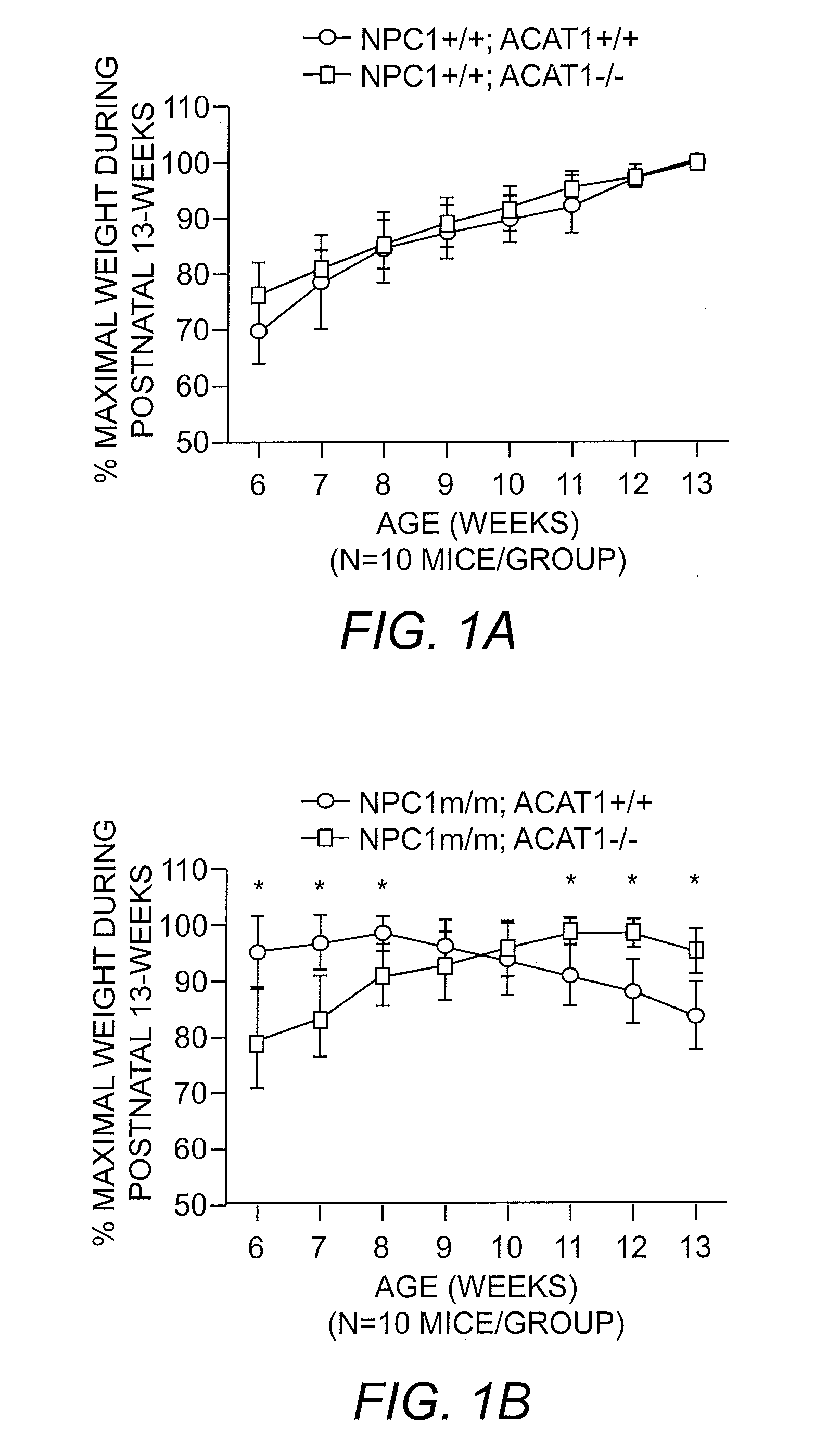Methods for treating niemann-pick type c disease
a treatment method technology, applied in the field of niemann-pick type c disease treatment, can solve the problems of disease without cure, hepatomegaly and splenomegaly, progressive neurodegeneration,
- Summary
- Abstract
- Description
- Claims
- Application Information
AI Technical Summary
Benefits of technology
Problems solved by technology
Method used
Image
Examples
example 1
ACAT1-Deficiency Prolongs Survival of NPCm / m Mice
[0038]The Npc1m / m mouse model was chosen for use as the NPC disease model. Experiments were conducted in both male and female mice bred specifically to express the desired traits by crossing Acat1− / − mice with Npc1m / m mice to generate a mouse model that was ACAT1-deficient and also exhibiting the NPC disease phenotype. The mice were observed for the effect of Acat1 gene ablation (ACAT1 inhibition) on lifespan and on symptoms associated with the NPC disease phenotype. The results showed that Acat1 gene ablation prolonged the lifespan of the Npc1m / m mouse by 34% (Npc1m / m, Acat1− / −) as compared to Npc1m / m mice without Acat1 gene knockout (Npc1m / m, Acat1+ / +). Specifically, median survival for Npc1m / m, Acat1+ / + mice (N=13) was 113 days while in Acat1− / − mice (N=7) median survival was 138 days; and mean survival in the Npc1m / m, Acat1+ / + mice was 102 days while in Npc1m / m, Acat1− / − mice mean survival was 137 days (P=2.39 E-6). Comparable num...
example 2
Efficacy of ACAT Inhibitors in the Treatment of NPC Disease
[0040]Experiments are performed in a mouse model of NPC disease, Npc1m / m wild-type mice. Based on earlier work showing that drug treatment is effective in prolonging the lifespan of the NPC− / − mice only when mice were treated at a very young age (PND 7) (Liu et al. 2010. J. Lipid Res. 51:933-944; Griffin et al. 2004. Nat. Med. 10:704-711; Liu et al. 2009. Proc. Natl. Acad. Sci. USA 106:2377-2382), experiments are carried out by beginning treatment of mice on PND 7 (preweaning) or PND 21 (the day when mice are weaned). For mice at PND 7, the ACAT inhibitor (e.g., CI-1011) is administered in sesame oil by daily subcutaneous injection for up to 7 days. The injection sites of all animals are uniform to ensure uniform delivery of drug to different tissues. For mice treated on PND 21, the ACAT inhibitor is suspended in methylcellulose and administered by oral gavage daily for up to 7 days. After each treatment, the ACAT inhibitor ...
example 3
Determination of Sterol Composition Analysis in Mouse Brains
[0046]Mice forebrains are homogenized and extracted using chloroform:methanol (2:1; at 12 mL final volume per mouse brain), dried down under nitrogen, and redissolved in MeOH. A 10% sample is placed in a 2-mL GC / MS autosampler vial, dried down, and trimethyl-silyl derivatized overnight at room temperature with 0.5 mL TRI-SIL TBT (Pierce). One microliter of derivatized sample (or 0.1 μL for cholesterol measurements) is injected into a SHIMADZU QP 2010 GC-MS instrument. GC / MS analysis of sterols is according to known methods (see Ebner et al. 2006. Endocrinology 147:179-190) using selected ion monitoring (cholesterol, 329, 353, 368, 458; desmosterol, 441; lanosterol, 393; 24SOH, 413) and standard curves for quantification.
PUM
| Property | Measurement | Unit |
|---|---|---|
| Selectivity | aaaaa | aaaaa |
Abstract
Description
Claims
Application Information
 Login to View More
Login to View More - R&D
- Intellectual Property
- Life Sciences
- Materials
- Tech Scout
- Unparalleled Data Quality
- Higher Quality Content
- 60% Fewer Hallucinations
Browse by: Latest US Patents, China's latest patents, Technical Efficacy Thesaurus, Application Domain, Technology Topic, Popular Technical Reports.
© 2025 PatSnap. All rights reserved.Legal|Privacy policy|Modern Slavery Act Transparency Statement|Sitemap|About US| Contact US: help@patsnap.com

